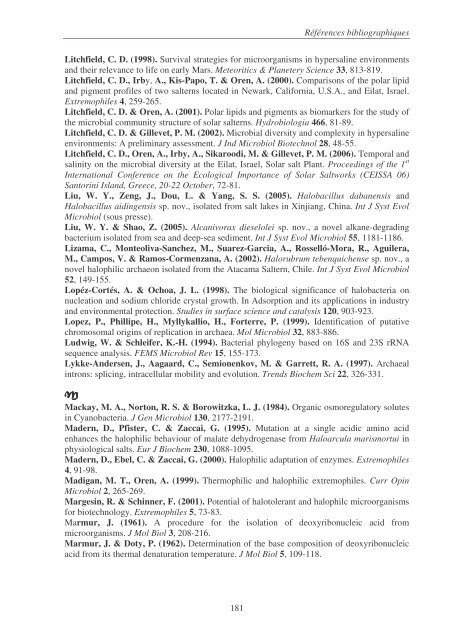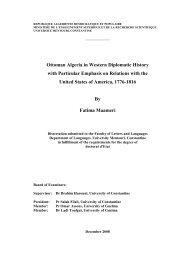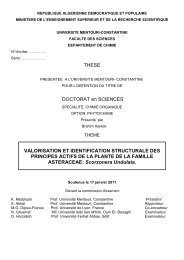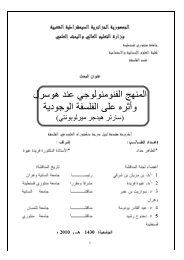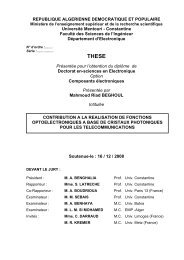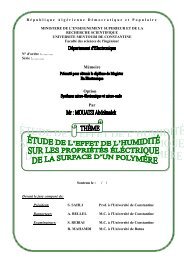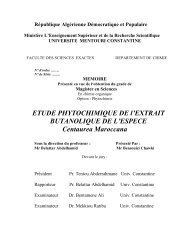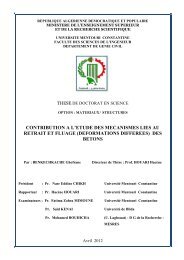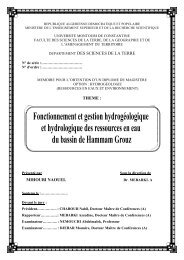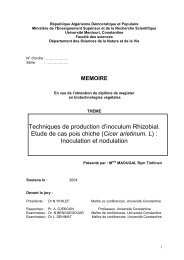(Thèse partie 1)
(Thèse partie 1)
(Thèse partie 1)
Create successful ePaper yourself
Turn your PDF publications into a flip-book with our unique Google optimized e-Paper software.
181<br />
Références bibliographiques<br />
Litchfield, C. D. (1998). Survival strategies for microorganisms in hypersaline environments<br />
and their relevance to life on early Mars. Meteoritics & Planetery Science 33, 813-819.<br />
Litchfield, C. D., Irby, A., Kis-Papo, T. & Oren, A. (2000). Comparisons of the polar lipid<br />
and pigment profiles of two salterns located in Newark, California, U.S.A., and Eilat, Israel.<br />
Extremophiles 4, 259-265.<br />
Litchfield, C. D. & Oren, A. (2001). Polar lipids and pigments as biomarkers for the study of<br />
the microbial community structure of solar salterns. Hydrobiologia 466, 81-89.<br />
Litchfield, C. D. & Gillevet, P. M. (2002). Microbial diversity and complexity in hypersaline<br />
environments: A preliminary assessment. J Ind Microbiol Biotechnol 28, 48-55.<br />
Litchfield, C. D., Oren, A., Irby, A., Sikaroodi, M. & Gillevet, P. M. (2006). Temporal and<br />
salinity on the microbial diversity at the Eilat, Israel, Solar salt Plant. Proceedings of the 1 st<br />
International Conference on the Ecological Importance of Solar Saltworks (CEISSA 06)<br />
Santorini Island, Greece, 20-22 October, 72-81.<br />
Liu, W. Y., Zeng, J., Dou, L. & Yang, S. S. (2005). Halobacillus dabanensis and<br />
Halobacillus aidingensis sp. nov., isolated from salt lakes in Xinjiang, China. Int J Syst Evol<br />
Microbiol (sous presse).<br />
Liu, W. Y. & Shao, Z. (2005). Alcanivorax dieselolei sp. nov., a novel alkane-degrading<br />
bacterium isolated from sea and deep-sea sediment. Int J Syst Evol Microbiol 55, 1181-1186.<br />
Lizama, C., Monteoliva-Sanchez, M., Suarez-Garcia, A., Rosselló-Mora, R., Aguilera,<br />
M., Campos, V. & Ramos-Cormenzana, A. (2002). Halorubrum tebenquichense sp. nov., a<br />
novel halophilic archaeon isolated from the Atacama Saltern, Chile. Int J Syst Evol Microbiol<br />
52, 149-155.<br />
Lopéz-Cortés, A. & Ochoa, J. L. (1998). The biological significance of halobacteria on<br />
nucleation and sodium chloride crystal growth. In Adsorption and its applications in industry<br />
and environmental protection. Studies in surface science and catalysis 120, 903-923.<br />
Lopez, P., Phillipe, H., Myllykallio, H., Forterre, P. (1999). Identification of putative<br />
chromosomal origins of replication in archaea. Mol Microbiol 32, 883-886.<br />
Ludwig, W. & Schleifer, K.-H. (1994). Bacterial phylogeny based on 16S and 23S rRNA<br />
sequence analysis. FEMS Microbiol Rev 15, 155-173.<br />
Lykke-Andersen, J., Aagaard, C., Semionenkov, M. & Garrett, R. A. (1997). Archaeal<br />
introns: splicing, intracellular mobility and evolution. Trends Biochem Sci 22, 326-331.<br />
Mackay, M. A., Norton, R. S. & Borowitzka, L. J. (1984). Organic osmoregulatory solutes<br />
in Cyanobacteria. J Gen Microbiol 130, 2177-2191.<br />
Madern, D., Pfister, C. & Zaccai, G. (1995). Mutation at a single acidic amino acid<br />
enhances the halophilic behaviour of malate dehydrogenase from Haloarcula marismortui in<br />
physiological salts. Eur J Biochem 230, 1088-1095.<br />
Madern, D., Ebel, C. & Zaccai, G. (2000). Halophilic adaptation of enzymes. Extremophiles<br />
4, 91-98.<br />
Madigan, M. T., Oren, A. (1999). Thermophilic and halophilic extremophiles. Curr Opin<br />
Microbiol 2, 265-269.<br />
Margesin, R. & Schinner, F. (2001). Potential of halotolerant and halophilc microorganisms<br />
for biotechnology. Extremophiles 5, 73-83.<br />
Marmur, J. (1961). A procedure for the isolation of deoxyribonucleic acid from<br />
microorganisms. J Mol Biol 3, 208-216.<br />
Marmur, J. & Doty, P. (1962). Determination of the base composition of deoxyribonucleic<br />
acid from its thermal denaturation temperature. J Mol Biol 5, 109-118.


